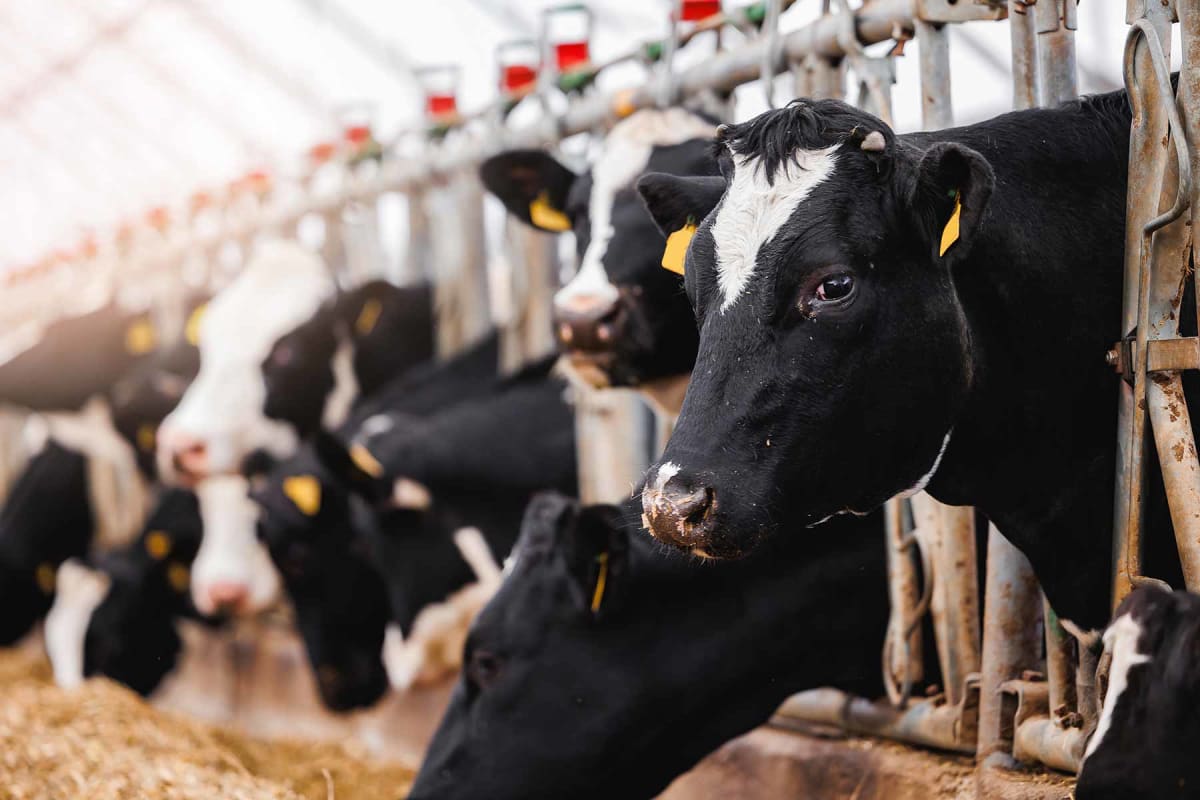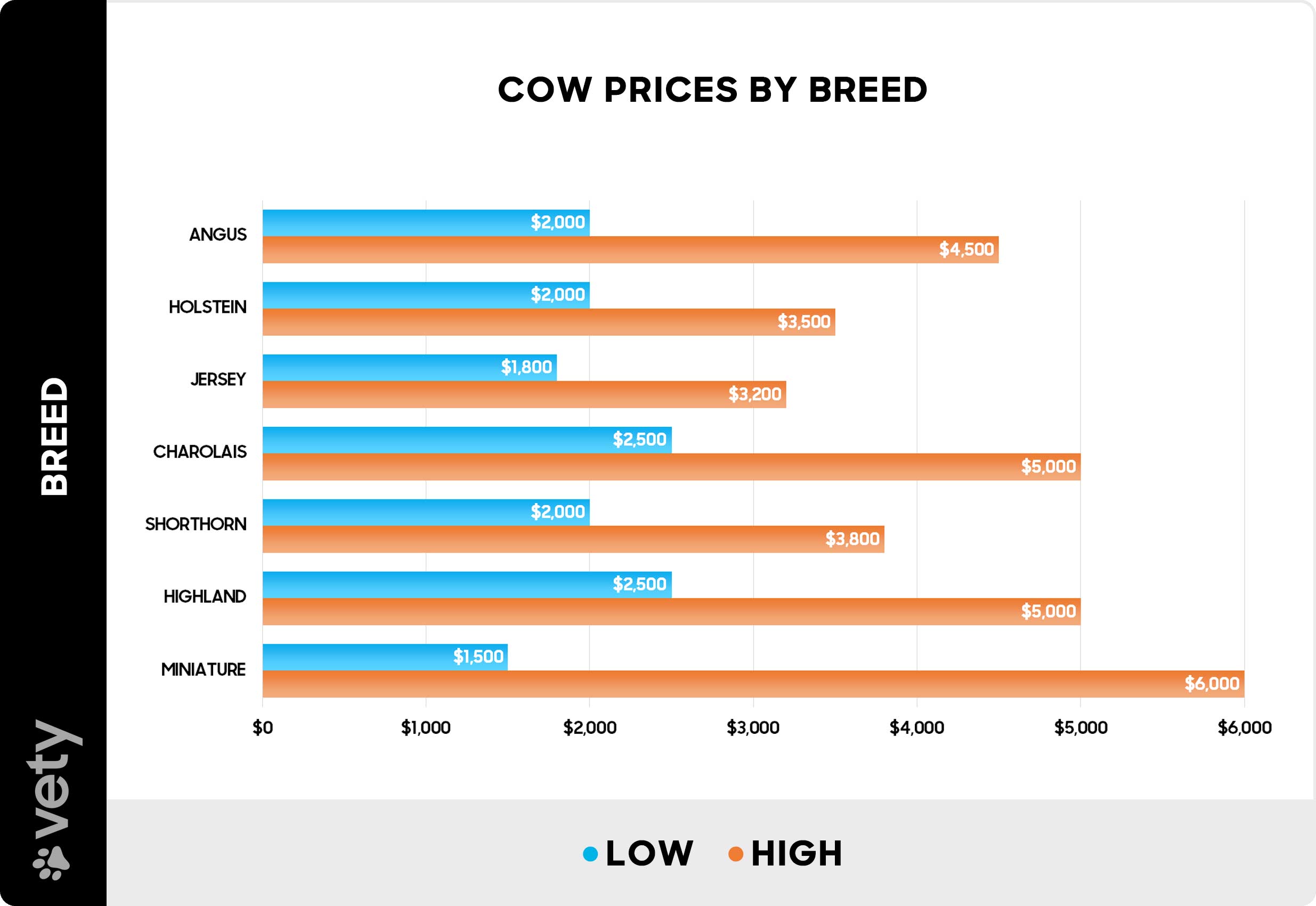
How much does a cow cost?
How much does a cow cost?
$1,500 – $6,000+ average cost (cow itself)
$60 – $300+ average feed cost (per month)
Average cow price
A cow costs $1,500 to $6,000+ on average, depending on the breed, age, purpose, certification, and market trends. Feeder cow prices are lower than show cow prices, which can reach $3,000 to $30,000 or more. This guide breaks down current prices, important cost factors, and the ongoing expenses of cow ownership.
| Cow type | Price range | Details |
|---|---|---|
| Commercial beef | $1,500 – $4,500 | Raised for meat production |
| Dairy cow | $1,500 – $3,500 | Used for milk, cheese, and other products |
| Show / Breeding | $3,000 – $30,000 | High pedigree, show or breeding stock |
| Organic Certified cow | $2,500 – $6,000 | Certified organic, higher demand and cost |
How much does a baby cow cost?
Cow calves cost $800 to $2,500. While they cost less up front than mature cows, calves require more time and resources to reach maturity and productivity. Mature cows offer immediate production, such as milk or breeding, but come at a higher purchase price.
| Age | Price range |
|---|---|
| Calf | $800 – $2,500 |
| Mature cow | $1,500 – $6,000+ |
Cow prices by breed
This table below shows the average cow prices by breed. Highland cow prices are higher than average, as are mini cow prices. For the most accurate pricing, check with local auctions, breeders, or extension services, as regional and market fluctuations may apply.

| Breed | Price range (mature cow) |
|---|---|
| Angus | $2,000 – $4,500 |
| Holstein | $2,000 – $3,500 |
| Jersey | $1,800 – $3,200 |
| Charolais | $2,500 – $5,000 |
| Shorthorn | $2,000 – $3,800 |
| Highland | $2,500 – $5,000 |
| Miniature | $1,500 – $6,000 |
Angus
Angus cattle cost $2,000 to $4,500 for a mature cow. Farmers prize Angus for their exceptional beef marbling, adaptability, and early maturity. These cows thrive in many climates and remain a top choice for both commercial and small-scale beef production.
Holstein
Holstein cows range from $2,000 to $3,500. As leaders in dairy production, Holsteins offer high daily milk yields and efficient feed conversion. Their large size and gentle temperament make them popular on both large and small dairy farms.
Jersey
Jersey cows sell for $1,800 to $3,200. Known for producing rich, high-butterfat milk, Jerseys have lower feed costs due to their smaller size. Their docile nature and premium milk make them favorites on family farms and specialty dairies.
Charolais
Charolais cattle cost $2,500 to $5,000 for mature animals. These large, muscular cows grow quickly and are popular for beef production. Producers often crossbreed Charolais to boost growth rates and meat quality in their herds.
Shorthorn
Shorthorn cows cost $2,000 to $3,800. Farmers value Shorthorns for their dual-purpose use (beef and milk) and their calm, adaptable nature. Shorthorns also improve herd genetics through crossbreeding.
Highland
Highland cows cost $2,500 to $5,000 each. Their long horns and shaggy coats help them thrive in harsh climates. Buyers choose Highlands for their hardiness, unique appearance, and ability to graze on rough pasture.
Miniature
Mini cows cost $1,500 to $6,000 on average. Their small size and lower feed requirements appeal to small farms and homesteads. Miniature breeds are often kept as pets, lawn mowers, or small-scale milk producers, and their rarity can drive up prices.
Cow cost factors
In addition to the cost of the cow itself, be sure to budget for feed, vaccines, housing, water, and other equipment. If you plan on breeding your cow, you'll also have to pay for artificial or natural insemination.
| Expense category | rice range | Notes |
|---|---|---|
| Feed | $700 – $3,600 per cow per year | Hay, grain, pasture, supplements |
| Veterinary care | $100 – $500 per cow per year | Exams, vaccines, emergency care |
| Shelter | $500 – $2,000 (one-time) | Barns, sheds, bedding |
| Fencing | $1,000 – $7,000 (one-time) | Perimeter and cross-fencing |
| Troughs | $100 – $500 (one-time) | Water troughs, buckets, feeders |
| Manure management | $200 – $800 per year | Removal, composting, equipment |
| Breeding fees | $50 – $200 per breeding | For herds using artificial insemination |
| Insurance | $50 – $200 per cow per year | Optional, for valuable animals |
The following factors can also impact cow prices:
Health: Younger, healthy cows with plenty of productive years ahead of them tend to cost more than older cows with a history of illness.
Pasture: If you have enough land to let the cow or cows roam, they will likely be healthier than if you keep them in a smaller area. Split rail fencing costs $3,000 to $7,000, depending on the size. Barbed wire fencing costs $2,000 to $2,200 per acre.
Market conditions: Supply, demand, and feed prices directly impact cow prices.
Location: Regional price differences can affect transportation and local market rates.
Pedigree: Registered or award-winning cows with documented lineage cost more.
Transportation: Delivery fees add to the total purchase price, especially over long distances.
Cow grains cost
Feeding a cow involves a mix of grains, hay, pasture, and supplements, and it's the largest ongoing expense for cattle owners. On average, expect to spend $2 to $5 per day per beef cow, or at least $60 to $150 monthly, depending on feed quality and pasture availability.
Dairy cows, which consume more, cost $5 to $10 daily, or $175 to $300 monthly or more. Hay alone averages 2.4 tons per cow per year, and supplement costs rise if pasture is limited or hay quality is poor. Balanced nutrition with minerals and salt is essential for health and productivity.

FAQs about raising a cow
How long do cows live?
Cows live for an average of 15 to 20 years when cared for in a low-stress environment. However, on commercial farms, their productive lifespan is often shorter due to management practices and economic factors.
How many stomachs does a cow have?
A cow has one stomach divided into four compartments: the rumen, reticulum, omasum, and abomasum. These specialized sections allow cows to digest tough plant materials efficiently by fermenting and breaking down food with the help of microbes before absorbing nutrients.
Do female cows have horns?
Female cows can have horns, depending on their breed. Both males and females of many cattle breeds naturally grow horns unless they come from polled (hornless) genetics or have been dehorned at a young age.
How much does a cow weigh?
Most adult cows weigh 1,000 to 1,800 pounds. Dairy breeds like Holsteins often reach the higher end of this range, while smaller breeds and miniatures weigh less.
What do cows eat?
Cows eat a diet of grasses, hay, silage, and grains. Farmers often supplement their feed with minerals, salt, and vitamins to ensure proper nutrition and support healthy growth and milk production.
How long are cows pregnant?
A cow's pregnancy, or gestation period, lasts roughly 9 months, or 280 days. After giving birth, farmers can breed cows again to maintain yearly calving cycles.
Can cows swim?
Cows can swim and will paddle through water if needed. While they don't seek out swimming for recreation or enjoyment, they can cross small rivers or ponds when grazing or moving between pastures.
Do cows sleep standing up?
Cows sometimes doze off while standing, but they lie down to enter deep, restful sleep. Lying down allows them to fully relax their muscles and achieve the restorative rest they need.
Choosing a farm or supplier
Choosing the right farm, cattle auction, or livestock market when buying a cow ensures you get healthy, productive animals that meet your goals. A reputable supplier will provide detailed records, honest communication, and ongoing support. Follow these steps to make an informed decision:
Review the breeding program and ask for genetic and performance records, including Expected Progeny Differences (EPDs).
Inspect the health, structural soundness, and temperament of the animals in person.
Ask about reproductive performance, fertility, and longevity of their cattle.
Request references or testimonials from previous buyers.
Make sure the supplier provides clear information on after-sale support and guarantees.
Questions to ask owners
Before making a purchase, ask the owner of the cow these questions:
Is the cow healthy and free from disease? Can you provide a recent veterinary report?
Has the cow received all recommended vaccinations and parasite treatments?
What is the cow's age, breed, and reproductive history?
Has she calved before, and were births unassisted?
Is the cow registered or certified, and can I see the registration or organic certification papers?
What is the cow's genetic background? Have you done any genetic testing or parent verification?
Can you show me the cow's performance records, including milk yield or growth rates?
Does the cow have permanent identification, such as a tag or tattoo, and does it meet transport requirements?
What is the cow's temperament and how does she behave around people and other animals?
Has the cow or herd had any cases of contagious disease, such as tuberculosis, brucellosis, or mastitis?
What is the feeding program, and what has the cow been eating?
Can you provide references from previous buyers or allow me to visit the herd in person?
If the cow is bred, can you provide proof of pregnancy and details about the sire?
What after-sale support or guarantees do you offer if the cow has health or breeding issues?